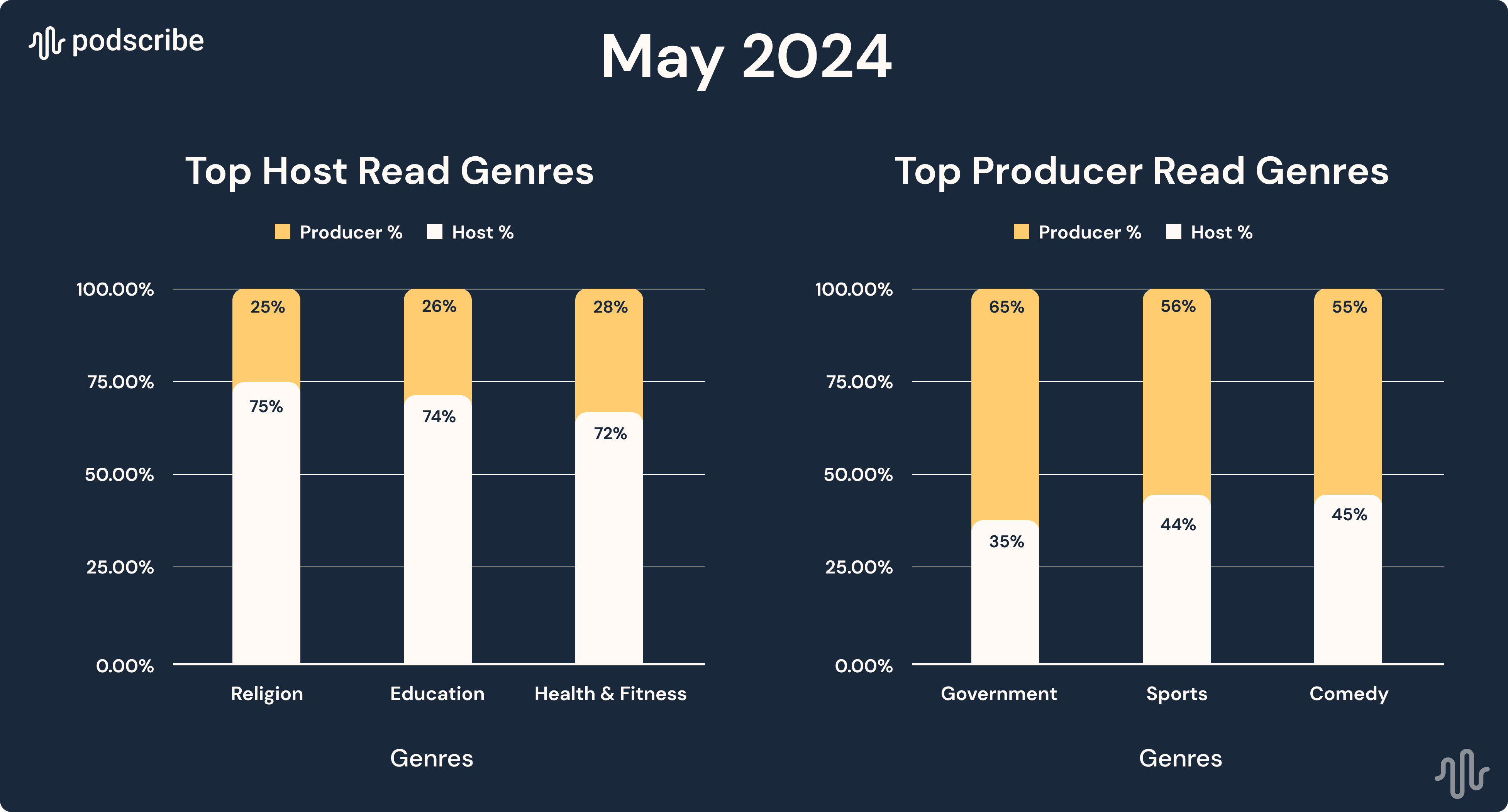This Week in the Business of Podcasting
Long-time readers of The Download will be familiar with the accidental themes I discover when collecting together the highlights of the week’s podcasting news. This week keep an eye out for podcasting’s future, and the power of sports. Now, let’s get into the news.

Transparency. Performance. Automation.
How Many Ads Listeners Expect
This Wednesday from Tom Webster at Sounds Profitable: The new podcast advertising study Ad Nauseam surveyed just over 1,000 weekly podcast listeners on how they interfaced with podcast ads. On average, respondents expect to hear three ads in a given podcast episode and the majority of them did in fact hear three ads in the last podcast they listened to. What’s particularly noteworthy here is the fact that, when asked how many ads in a podcast episode is the ideal number they expect to hear, “zero” is not the answer. A quote from Webster:
“We have built a special snowflake with podcast advertising. Yes, we have a way to continue monetizing the space and building a sustainable career path for creators. But I hope you’ll agree with me that the better path for that is not doubling the ads on the biggest shows, but making buying ads on the smallest shows a friction-free and lucrative experience.”
Webster points to a podcast listening experience on Tuesday night when he heard three different issues over two episodes: a beer ad reminding listeners the NBA Finals were coming up (a week after the last Finals game), an ad for a product wholly unrelated to sports with a shoehorned comment about listeners being “busy supporting your local sports team,” and a host throwing to a DAI ad break that had no ads.
Music Groups Team Up to Sue Music-Generating AI
This Monday from Sam Klebanov at Morning Brew: A group of music labels, including Universal Music Group, Sony Music group, and Warner Music group have filed lawsuits against AI song generating startups Suno and Udio (the latter being most notable for being used to make the BBL Drizzy beat).
The lawsuits allege both startups have not fully disclosed the contents of data sets used to train their musical AI and are concealing the fact they used songs from the labels’ catalogs to train the AI, leading them to generate music oddly familiar to copyrighted tracks. The suits claim AI imitators could crowd out human-made songs and lead to financial losses. They are demanding damages of up to $150,000 per instance of copyright infringement.
This is not the first instance of audio AI content getting in legal hot water. Back in April the estate of George Carlin sued AI-promoting comedy podcast Dudesy for posting an hour-long AI-generated George Carlin special. The special was hand-written by Dudesy host Chad Kultgen and fed into a voice cloning AI. The now-settled lawsuit took issue with Dudesy training an AI generator on copyrighted audio of George Carlin. The special has been removed from YouTube and all references to the special have been retroactively edited out of the podcast. A quote from George Carlin’s daughter Kelly Carlin in the New York Times coverage of the case:
““While it is a shame that this happened at all, I hope this case serves as a warning about the dangers posed by A.I. technologies and the need for appropriate safeguards.”
What Radio’s Past Can Teach for Podcasting’s Future
This Tuesday from Signal Hill Insights President Jeff Vidler: Back in the 70s FM radio was the new kid on the advertising block. FM stations had a competitive advantage in running fewer ads than AM stations and in higher audio fidelity.
Then, as FM achieved mass appeal and AM fell to the wayside, the cool new kid factor faded. Along with that, was FM’s ability to hand-pick ads and provide a more curated, personal experience on a per-station basis.
Podcasting is still in its cool kid phase, but has the opportunity to learn from FM’s history and not lose the personal touch that makes up one of the industry’s superpowers. Podcasting covers virtually every possible niche and is intensely personal, with studies like Ad Nauseam and The Ad Bargain backing that up. 28% of Ad Bargain respondents watch or listen to all ads they encounter on podcasts, 5% more than radio in second place. To leverage this, podcasting needs to prioritize the personal relevance of podcast ads, as Ad Nauseam found lack of interest or relevance is the primary motivator for respondents (37%) skipping an ad in their favorite podcast.
Vidler evokes Mark Twain with the famous quote “history doesn’t repeat itself, but it often rhymes.” Podcasting could follow in FM’s footsteps, or it could forge its own path by working to preserve the distinct, personal listening experience that makes podcasts unique.
New Study Finds Post-Cookie Preparedness is Backsliding
This Monday from Kayleigh Barber at Digiday: A study from Adobe surveying 2,841 marketers in Q1 across seven countries found fewer marketers feel prepared for third-party cookie retirement than in recent years, with 49% still relying on third-party data. A quote from Barber:
“Adobe’s study found that only 28% of respondents spend at least half of their marketing budgets on cookie-based activations (down from 45% two years ago), but the majority of spend is being allocated to environments that help replicate the easy audience targeting experience, like social platforms’ walled gardens.”
62% of respondents said they plan to shift their spend primarily to walled garden ecosystems like social media platforms. Podcasting, by virtue of having always cultivated first-party data as a valuable resource, is particularly prepared for a post-cookie world. The onus is on our industry to make marketers/brands outside of our sphere aware of that readiness.
Acast Promotes News Podcasts in UK Pre-Election Period
This Thursday from Podcasting Today: The UK general election is set for July 4th, which means June is the region’s pre-election period.
During this period, the UK government goes into a media blackout and abstains from providing any public funds to advertising campaigns on media that involve politics, keeping the government neutral during the month before General Election.
During this period of abstaining, Acast is harnessing the increase in political content. According to Acast and Podchaser data, UK politics-focused podcasts have seen a 53% increase in unique listens. The company is currently focusing on recommending politically-themed podcasts in the Acast ecosystem as well as running out-of-home ads in major UK railway stations to target commuters.
Podscribe Ad Read Index: May 2024
Top Genres by Read Type: Host vs Producer
What genres had mostly host-read or producer-read ads? In May, “Religion” stayed at the top for host-read followed by “Education” and “Health & Fitness”. On the flip side “Government” and “Sports” remained top for producer reads month over month while “Comedy” replaced History from April.
Quick Hits
While they may not be top story material, the articles below from this week are definitely worth your time:
- New York Times to Move Podcasts Behind Paywall by Anne Steele. All but the latest three episodes of The Daily will be archived behind the paywall, as well as early releases of new Serial episodes.
- Apple TV+ reveals trailer for new Apple Original podcast “My Divo” premiering July 1. The show marks the first ever dual-language Apple Original and the first instance of an AppleTV+ video podcast allowing subscribers to access episodes early on Apple Podcasts.
- Spotify Announces New U.S. Plans. The new pricing and plan layouts include a $1 cheaper option without access to the 15 hours of audiobook streaming, and a $9.99 plan that only provides the 15 hours of audiobook access.
- YouTube will ask iOS users to ‘Allow’ tracking for more personalized ads by Abner Li. The notification will make users aware they will receive random, possibly repeated ads if they don’t provide the tracking details.
- Medals, Mics, & Marketing: How sports podcasts bring brands closer to the conversation. The study from Global takes a look at the power of sports podcast advertising and how it can be leveraged.














































































































































































































